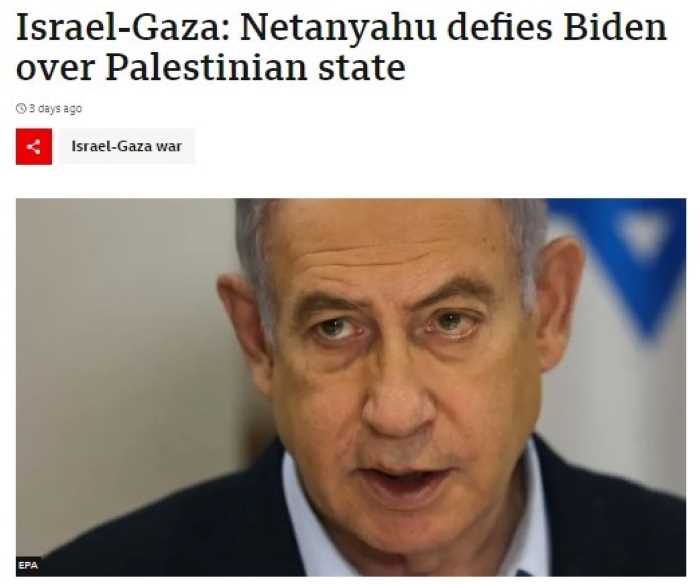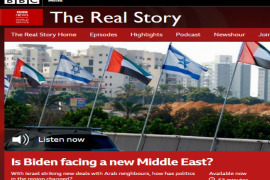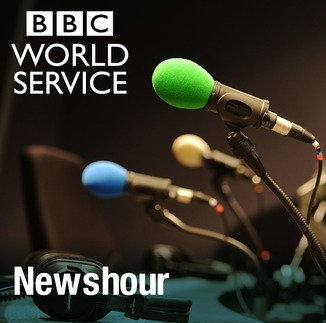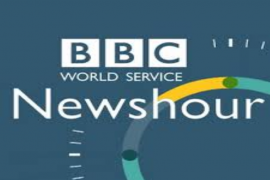Over the past few days visitors to the BBC News website have seen no small amount of content relating to the topic of the two-state solution, most of which was credited to the BBC’s Rome correspondent Mark Lowen who recently arrived in Israel.
Netanyahu publicly rejects US push for Palestinian state Mark Lowen, January 18th, 2024: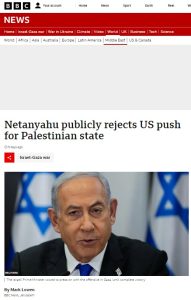
“Israel’s allies, including the US – and many of its foes – have urged a revival of the long-dormant “two-state solution”, in which a future Palestinian state would sit side-by-side with an Israeli one.
The hope in many circles is that the current crisis could force the warring parties back to diplomacy, as the only viable alternative to endless cycles of violence. But from Mr Netanyahu’s comments, his intention appears quite the opposite.” […]
“Mr Netanyahu has spent much of his political career opposing Palestinian statehood, boasting just last month that he was proud to have prevented its establishment, so his latest remarks come as no surprise.
But the very public rebuttal of Washington’s diplomatic push, and determination to stay the current military course, show the chasm widening with Israel’s western allies.” […]
“Israel’s prime minister’s comments will please his dwindling support base and the far-right ministers who prop up his government.
But they will dismay those at home and abroad who are increasingly horrified by the human cost of this war.”
Eisenkot: Key Israeli war leader challenges Netanyahu over Gaza strategy Mark Lowen, January 19th, 2024: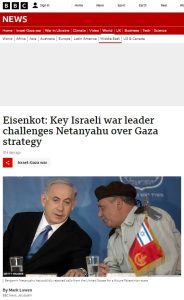
“But Mr Netanyahu has spent his career resisting a Palestinian state and just last month boasted that he was proud to have prevented it.
The timing of yet another rebuttal of the Biden Administration will heighten a sense of his growing international isolation.” […]
“Amid the preponderance of death in this conflict, Israel’s allies hope life could be breathed back into the dormant two-state plan as the only way to create lasting peace.
But Mr Netanyahu’s comments appear to show he wants quite the opposite: a position he undoubtedly hopes would be more in line with a future administration of Donald Trump and which could have been timed to give his old American friend red meat to rally his pro-Israel supporters in a US election year.” […]
“But Israel’s prime minister seems to have staked his political survival on a hard-line anti-Palestinian position.
No longer can he sell himself as “Mr Security” after the worst attacks in Israel’s history happening under his watch.
Now it’s “Mr No Independent Palestine”: a position he believes will chime with the public mood here that, while increasingly out of love with its prime minister, is still too traumatised to conceive of a Palestinian state next door.”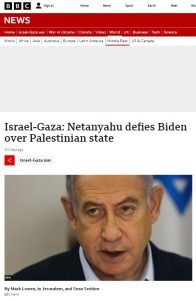
Israel-Gaza: Netanyahu defies Biden over Palestinian state Mark Lowen and Sean Seddon, January 21st, 2024:
“The US believes a Palestinian state alongside Israel – known as a “two-state solution” – is vital for long-term stability.
But the White House acknowledged this week the US and Israeli governments “clearly see things differently”.” […]
“The comments will dampen hopes in some circles that the Gaza crisis could result in Israeli and Palestinian leaders restarting diplomatic negotiations and kickstarting the dormant peace process.”
Shapps ‘disappointed’ by Netanyahu opposition to Palestinian state uncredited, January 21st, 2024:
“Creating two separate states is the only solution to ending the conflict between Israel and the Palestinians, the defence secretary has said.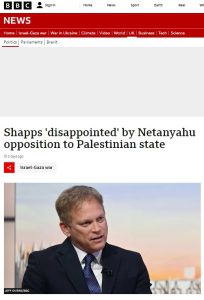
Grant Shapps said it was “disappointing” that Israel’s prime minister has rejected the idea.
Benjamin Netanyahu’s position was not “a surprise”, he told the BBC.
But Mr Shapps said Palestinians “deserved” a sovereign state, adding “I really don’t see that there is another solution”.”
Other BBC journalists have echoed that framing:
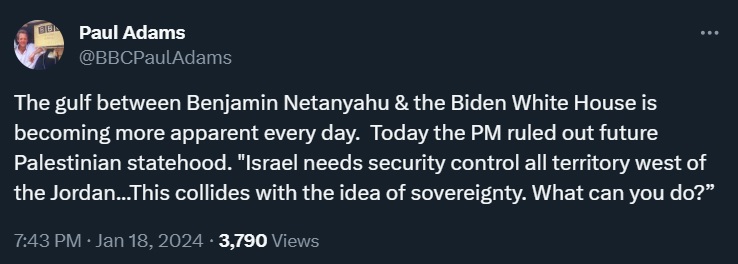
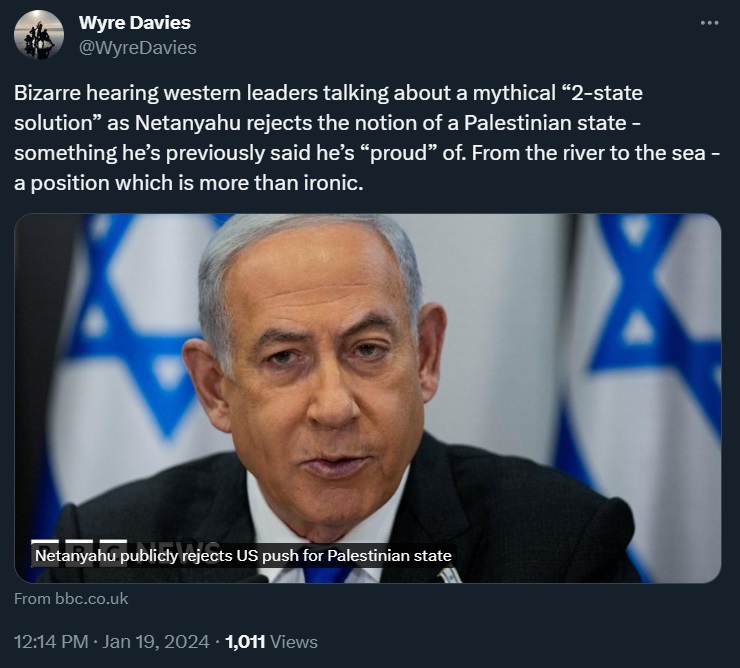
Whatever one’s opinion of Netanyahu’s statements and regardless of one’s stance on the topic of the two-state solution either in the present context or in general, it is all too obvious that there is a very significant aspect to this story which the BBC has chosen to completely erase from audience view.
Just last month the BBC published a report and a briefing on the topic of a rise in support for Hamas in Palestinian Authority controlled areas: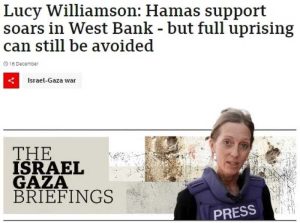
“Support for Hamas – and armed resistance more generally – has risen sharply since the war in Gaza began.
An opinion poll by the Centre for Policy and Survey Research in Ramallah found that support for Hamas in the West Bank had more than tripled. Meanwhile, support for the West Bank’s ruling party, Fatah, had dropped significantly. More than 90% of respondents thought Palestinian President Mahmoud Abbas should resign.”
What the BBC has to date avoided telling its audiences, however, is what that means as far as any chances of “restarting diplomatic negotiations and kickstarting the dormant peace process” are concerned.
Earlier this month Hamas leader Khaled Mashaal spelled out in very clear terms the approach of his terrorist organisation to what Lowen described as “the dormant two-state plan”:
“People are saying now that the October 7 war has opened a new horizon for a vision of a political settlement. Here, they pull out their old ‘merchandise’ of the two-state solution. I would like to say two things about the two-state solution. First, we have nothing to do with the two-state solution. We reject this notion, because it means you would get a promise for a [Palestinian] state, yet you are required to recognize the legitimacy of the other state, which is the Zionist entity. This is unacceptable. We demand to be liberated, to get rid of the occupation, and to have our independence, and our state. [Israel] is my enemy. It is not my concern.” […]
“Obviously, the position of Hamas, and the position of the vast majority of the Palestinian people, especially following October 7, I believe that the dream and the hope for Palestine from the River to the Sea, and from the north to the south, has been renewed.” […]
“I believe that October 7 has enhanced this conviction, has narrowed the disagreements, and has turned the idea of liberating Palestine from the River to the Sea into a realistic idea that has already begun. It is not something [merely] to be expected or hoped for. It is part of the plan, part of the agenda, and we are standing on its threshold, Allah willing.”
Other Hamas leaders have been equally vocal about that organisation’s intentions:
“The most important thing is that the scenario of liberating [Palestine], returning [to it], defeating the enemy and dismantling its enterprise has become feasible, even completely feasible. October 7 was a scaled-down model of the final war of liberation and the disappearance of the Zionist occupation.” [Bassem Na’im, Al Jazeera website, January 16, 2024]
“Israel is a country that has no place on our land. We must remove that country, because it constitutes a security, military, and political catastrophe to the Arab and Islamic nation, and must be finished. We are not ashamed to say this, with full force. We must teach Israel a lesson, and we will do this again and again. The Al-Aqsa Flood is just the first time, and there will be a second, a third, a fourth, because we have the determination, the resolve, and the capabilities to fight.” [Ghazi Hamad, LBC TV, October 24 2023]
Remarkably, such statements have not been the topic of four BBC reports in four days.
BBC framing of the topic of the two-state solution has long been problematic. In December 2016 the BBC began telling its audiences that the two-state solution is “the declared goal” of the Palestinian leadership, ignoring the fact that it has rejected such offers in the past, that Hamas has no such goal and that Fatah and the Palestinian Authority have repeatedly refused to recognise Israel as the Jewish state. It rejected complaints concerning that portrayal, claiming that “[i]t could be argued, for instance, that Hamas do not qualify as leaders on the same footing as the internationally recognised PA – it depends on how “leaders” is defined”.
Concurrently, BBC audiences have seen no serious reporting on the topic of support for the October 7th massacres from representatives of “the internationally recognised PA”. As recently observed by Dr. Michael Milstein:
“…not one of the Palestinian leaders or public figures, had condemned the massacre. Most have stuck to a fixed set of reactions: denial of atrocities while at the same time glorifying them, indifference towards Israeli suffering, and above all establishing themselves in the classic role of the victims who attempt to explain the “context” for the war crimes committed.”
As we see in the above reports, years of avoidance of the topic of Palestinian opposition to the two-state solution enable BBC correspondents such as Mark Lowen to portray Israel as the sole impediment to “revival of the long-dormant “two-state solution”” and “lasting peace”. While that may be a popular narrative in some circles, its amplification certainly does not contribute to understanding of the issue or enhance the ability of BBC audiences to put statements made by their own government officials into an appropriate and informed perspective.

